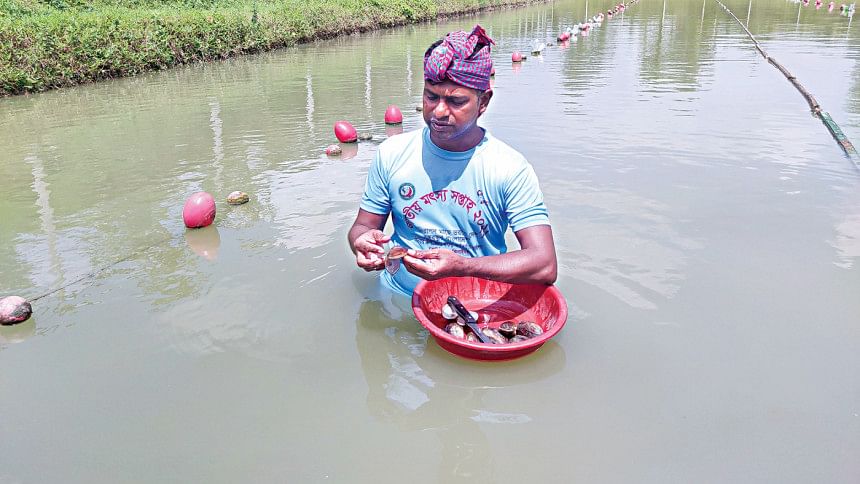Pearl farming: a rich avenue for earning

Pearl farming is providing a new road to success for people in Jhenaidah, where many youths have become allured to this form of aquaculture.
Dr Nazrul Islam, who obtained a doctorate from Shizuoka University in Japan, led the way with his farm in Panchlia village under Kotchandpur upazila.
The agro-entrepreneur cultures freshwater pearls in a native species of oyster, which are collected for Tk 3-5 apiece from local fishermen.

He then sorts through the oysters to select the best ones for breeding in his pond, which currently houses around 15,000 of the molluscs.
Pearl farming is a promising industry in Bangladesh, according to Islam, who began the business with 2,000 oysters in 2020.
He has sold Tk 10 lakh worth of pearls up till October this year and expects to sell another Tk 12 lakh by next July.
To facilitate new entrepreneurs in the business, Islam has trained around 2,000 youths in different districts of the country.
Pearl farming alongside fish cultivation does not carry any extra cost for feeding the oysters as they only eat phytoplankton and algae, and are fairly easy to manage.
It is possible to produce pearls in oysters in just 6 to 8 months and besides, it is a woman-friendly business, Islam said.
Bangladesh has considerable demand for pears, which are used to make ornaments such as rings and buttons while they are also used in medicine and cosmetics.
Islam says his farm produces top grade pearls that sell at a good price through online platforms, such as social media, while companies like Aarong and local ornament makers buy them too.
Considering the demand for his pearls, Islam has already contacted business associations in Dhaka for wholesale.
The agro-entrepreneur graduated from Rajshahi University in 1999 and then completed his post-graduation the following year.
After that, Islam obtained a PhD in fisheries from the same university in 2008 but after being unable to live his dream of working for the institute, he moved to Japan for higher education in 2010.
It was there that he studied at Shizuoka University until 2013, when he returned with a Doctor of Science degree before joining the Japan International Cooperation Agency in 2014.
His life was going well in Dhaka, but the coronavirus pandemic changed everything.
Islam's department was closed down following the Covid-19 outbreak in 2019 and after losing his job, he returned to the village in 2020 and set up an organic farm project called "Ryan Organic Agriculture" on 3.3 acres of land.
Five labourers work at the project while two serve as guards for the farm, which has about 30 species of fruit, vegetables, spices and two ponds.
Robjel Ali, one of the guards, said that visitors throng the project just to enjoy its beauty.
Bapi Biswas, an entrepreneur from Gopalganj, said he was trained in pearl farming by Islam in 2021.
He then began his own farm with 1,000 oysters at a total cost of Tk 45,000 in July 2022 and expects to start harvesting pearls in May 2023.
Liton Shikdar, another entrepreneur from Kotalipara upazila of Gopalganj, said that after being trained by Islam, he started his own farm with 1,000 oysters in May 2022 with funds from the local fishery office.
Similarly, Ashraful Alam, a local of Shibnagar village under Kotchandpur upazila, said he was inspired by Islam to learn about pearl farming, which is a very profitable business.
Sanjay Kumar, senior fisheries officer of Kotchadur upazila, said 60 farmers were trained on pearl farming in 2021.
"This training has been provided with the technical assistance of the Bangladesh Fisheries Research Institute. Pearls could make a huge contribution to the country's economy," he added.
Islam went on to say that he will make the district a pearl farming hub by expanding such activities.
In addition, he aims to remove unemployment problem and empower women in the region.
"For this, multiple training centres are needed for the smooth training of jobless youths and women," he said, adding that the government should allot a suitable loan for this purpose.

 For all latest news, follow The Daily Star's Google News channel.
For all latest news, follow The Daily Star's Google News channel. 



Comments